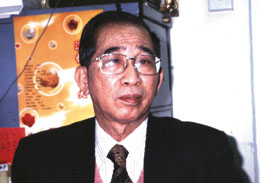 Questions of nationality
Questions of nationality


 Questions of nationality
Questions of nationality
Confused identities
By Pearl Lee
This confused identity of Hong Kong people has attracted numerous scholars who study the issue. Dr. Timothy Wong Ka Ying is one of them.
As a research officer at the Hong Kong Institute of Asia-Pacific Studies, he has looked into this phenomenon in several research projects.
In a survey in February, 60 percent of the interviewees defined themselves as Chinese rather than as Hongkongers.
However, as the questions became more specific, the interviewees showed different ideas.
On the one hand, they had clear ideas of sovereignty. For instance, 67.7 percent of interviewees thought that any problem concerning the Mainland, Hong Kong, Macau and Taiwan must be solved by Chinese. Also, most believed every Chinese should have single nationality, just like citizens of other countries.
On the other hand, when asked about possible conflicts of interest between Hong Kong and Mainland China, respondents suggested that Hong Kong people should stand up for their own interests.
“The nationalism of Hong Kong people is pragmatic, and the level varies,” Mr. Wong said.
According to his survey, 60 percent of interviewees put individual freedom and human rights before the interests of the Mainland.
Mr. Wong said that the long queues of applicants for the British National Overseas passports in March reflects his survey research findings. Although his survey showed that supporters of a single nationality were the majority, many people still applied for BNO passports.
“They only treat the passport as a convenient travel document. If the government of the United States allowed their people to hold more than one passport, Americans would do the same thing,” he claimed.
Mr. Leung Ping Kwan, senior lecturer of the Department of Comparative Literature of the University of Hong Kong, engages in cultural studies.
He said, “Patriotism means showing concern for the nation’s affairs and hoping it will become a better state to live in. Hong Kong people are becoming critical of local affairs, but this does not mean that they do not love the country. They still care enough to give their opinions on government policies, aiming at developing a better country.
“Hong Kong people only accept Chinese culture, like its political system, to a limited extent. They love the country rationally and critically,” said he.
To Legislator Szeto Wah, this is true.
He is chancellor of the Hong Kong Alliance in Support of Patriotic and Democratic Movements in China.
“To love a country and to support a government are absolutely two different things.”
He said Hong Kong people have a clear understanding of the difference.
“Whenever there are disasters on the Mainland, Hong Kong people are keen to help,” he said.
“Therefore, out of nationalism, Hong Kong people do fulfill their role as Chinese and offer help.
“But it is difficult to measure people’s nationalism because 6 million people can be classified as having different levels of nationalism,” he added.
However, Mr. Leung said, “These 6 million people do not culturally belong to the same race, as Hong Kong is an international society.”
Mr. Leung pays much attention to local culture and its connection with the national identities of the people in Hong Kong.
Said he: “Much Chinese traditional culture is still preserved in Hong Kong, even though we are under the rule of a colonial government. We have the same language — Chinese — which allows us to communicate with Chinese from other regions. We maintain similar values for our family life though Westernization has its influences.
“The local culture is not congruent with that of China. Although both have the same origin, it results in different political environments. So, we are used to calling ourselves ‘Hong Kong people’. “With regards to immigrants from different cultural backgrounds, Hong Kong is a unique complex.
“In the 1950s, the masses of immigrants from the Mainland had no roots in the soil of Hong Kong. But with the development of mass media, like the establishment of television stations in the 1960s, local popular culture started to develop. Together with a common dialect — Cantonese — local solidarity has been established since the 1970s.
“As 1997 is approaching, people are afraid to lose what they have earned. They have started to assess and evaluate to see which things and values they will give priorities to, constituing their cultural identity,” said Mr. Leung.
Another scholar supporting the use of the term ‘Hongkonger’ is Mr. Sze Man Hung, lecturer in the Department of General Education at Lingnan College.
He agreed that, starting from 1949, the development of Hong Kong began increasingly to diverge from that of mainland China, contributing to Hong Kong’s own identity.
Hong Kong people have their own values and lifestyles, different from those of Mainland China,” he said. “Within this unique cultural context, ‘Hongkonger’ is clearer than ‘Chinese’
when describing citizens of Hong Kong.”
Although the word “Hongkonger” smacks of regionalism, Mr. Sze said that Hong Kong in no sense could ever become independent of mainland Chinese culture.
“Many great problems will arise if Hong Kong is independent. The development of Hong Kong relies heavily on mainland China, including cheap food and labour. Local grassroots workers, supplying the labour power to secondary production, is also composed mainly of Mainland immigrants.
“It can be said that Hong Kong’s economic prosperity is based on the exploitation of Mainland people,” said Mr. Sze.
He continued that if Hong Kong became independent, the link with the Mainland would be cut, and this might affect various sectors concerned in society.
So, Mr. Sze said that although priority may be granted to local democracy over the interests of the country, returning to Chinese rule was necessary.

